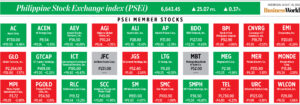Profits, market expansion to hinge on digital awareness

MICRO-, small-, and medium-sized enterprises (MSMEs) in the Philippines need to prioritize digital awareness to boost profits and expand their market share, according to experts.
“They need to be digitally aware of the services they can use to improve profits or expand market share,” said Rashesh Shreshta, economist at the Economic Research Institute for ASEAN and East Asia (ERIA), in an Asian Development Bank (ADB) webinar on Tuesday.
“Because they have limited capacity in terms of human resources, they don’t really need to fully understand how to integrate and use the cloud,” he added.
“Even if it feels intimidating going there, a lot of platforms have developed efficiency support for SMEs in the process,” said Jamie Ko, regional director for regional public affairs and policy at Grab Singapore.
In the IMD business school’s World Digital Competitiveness Ranking 2022 report, the Philippines ranked 56th out of 63 countries, falling behind neighboring economies such as Indonesia (51st), Thailand (40th), Malaysia (31st), and Singapore (4th).
The country improved two spots to 58th in the sub-factor of adaptive attitudes but declined to the 45th spot from the 37th spot in terms of business agility.
Furthermore, the 2022 e-commerce roadmap of the Department of Trade and Industry (DTI) outlined the desires and needs of MSMEs, including a detailed checklist on how to start and operate an online business, financial support for technologies, faster and more affordable internet speed, and online government services.
In addition to the Marcos administration’s push for the digitization of the economy, the DTI has introduced several initiatives, such as the 2024 Presidential Awards for Outstanding MSMEs and the Philippine E-commerce Platform (PEP) — an online store dedicated to homegrown products integrated with the eGov PH super app.
Another DTI project focuses on the digitization of the One Town, One Product (OTOP) Philippines, aiming to upgrade, upskill, and upsize MSMEs in terms of digital marketing while assisting communities in developing products and services deeply rooted in their cultural identity and comparative advantage.
Meanwhile, the Kanegosyo Center, a long-term government partnership with microfinance services provider Cebuana Lhuillier introduced in June, aims to provide comprehensive curated offerings in resources and assistive interventions for the growth and development of MSMEs.
Only 26% of MSMEs in the country are aware of digitization programs offered by the government and other institutions, according to a study by the DTI included in their roadmap.
Of the 400 MSMEs surveyed, the study showed very low digitization as 23% did not utilize ICT tools for business, and 51% were at level 1, only utilizing basic digital tools, e.g., Microsoft Office, e-mail, personal computers, etc.
Only 6% have advanced usage of digital tools, having purely online businesses or using advanced data analytics and other digital tools.
MSMEs have rated the importance of digital innovation in business at 3.6 on an ascending scale of 1 to 5. Those who favored digital innovation said that it helps improve efficiency or productivity and customer experience.
“MSMEs are encouraged to use ICT tools and social media to improve business operations, engage in e-commerce initiatives by partnering with reliable platform providers, logistics services, and payment gateways,” the study said.
“Digitization is a double-edged sword where it helps you expand your own market, but others can also expand to your market and get your market share,” Mr. Shreshta said.
“So you need to be able to implement some form of digitization as it enables more competition to foster.” — Miguel Hanz L. Antivola




